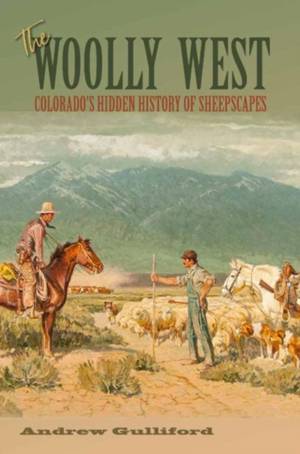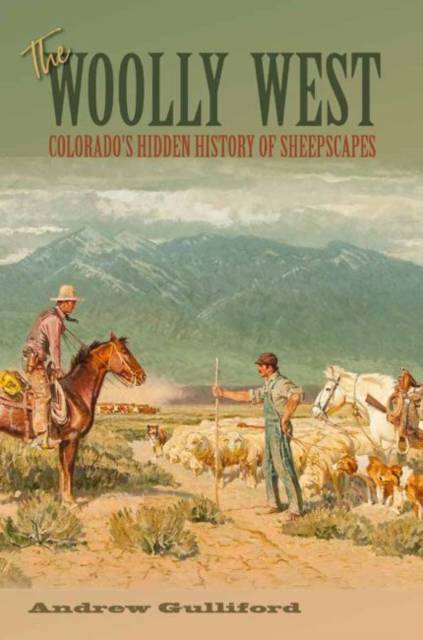
- Retrait gratuit dans votre magasin Club
- 7.000.000 titres dans notre catalogue
- Payer en toute sécurité
- Toujours un magasin près de chez vous
- Retrait gratuit dans votre magasin Club
- 7.000.0000 titres dans notre catalogue
- Payer en toute sécurité
- Toujours un magasin près de chez vous
Description
Winner, 2019 National Cowboy and Western Heritage Museum Western Heritage Award for the Best Nonfiction Book
Winner, 2019 Colorado Book Awards History Category, sponsored by Colorado Center for the Book
In The Woolly West, historian Andrew Gulliford describes the sheep industry's place in the history of Colorado and the American West. Tales of cowboys and cattlemen dominate western history--and even more so in popular culture. But in the competition for grazing lands, the sheep industry was as integral to the history of the American West as any trail drive.
With vivid, elegant, and reflective prose, Gulliford explores the origins of sheep grazing in the region, the often-violent conflicts between the sheep and cattle industries, the creation of national forests, and ultimately the segmenting of grazing allotments with the passage of the Taylor Grazing Act of 1934. Deeper into the twentieth century, Gulliford grapples with the challenges of ecological change and the politics of immigrant labor. And in the present day, as the public lands of the West are increasingly used for recreation, conflicts between hikers and dogs guarding flocks are again putting the sheep industry on the defensive.
Between each chapter, Gulliford weaves an account of his personal interaction with what he calls the "sheepscape"--that is, the sheepherders' landscape itself. Here he visits with Peruvian immigrant herders and Mormon families who have grazed sheep for generations, explores delicately balanced stone cairns assembled by shepherds now long gone, and ponders the meaning of arborglyphs carved into unending aspen forests.
The Woolly West is the first book in decades devoted to the sheep industry and breaks new ground in the history of the Colorado Basque, Greek, and Hispano shepherding families whose ranching legacies continue to the present day.
Winner, 2019 Colorado Book Awards History Category, sponsored by Colorado Center for the Book
In The Woolly West, historian Andrew Gulliford describes the sheep industry's place in the history of Colorado and the American West. Tales of cowboys and cattlemen dominate western history--and even more so in popular culture. But in the competition for grazing lands, the sheep industry was as integral to the history of the American West as any trail drive.
With vivid, elegant, and reflective prose, Gulliford explores the origins of sheep grazing in the region, the often-violent conflicts between the sheep and cattle industries, the creation of national forests, and ultimately the segmenting of grazing allotments with the passage of the Taylor Grazing Act of 1934. Deeper into the twentieth century, Gulliford grapples with the challenges of ecological change and the politics of immigrant labor. And in the present day, as the public lands of the West are increasingly used for recreation, conflicts between hikers and dogs guarding flocks are again putting the sheep industry on the defensive.
Between each chapter, Gulliford weaves an account of his personal interaction with what he calls the "sheepscape"--that is, the sheepherders' landscape itself. Here he visits with Peruvian immigrant herders and Mormon families who have grazed sheep for generations, explores delicately balanced stone cairns assembled by shepherds now long gone, and ponders the meaning of arborglyphs carved into unending aspen forests.
The Woolly West is the first book in decades devoted to the sheep industry and breaks new ground in the history of the Colorado Basque, Greek, and Hispano shepherding families whose ranching legacies continue to the present day.
Spécifications
Parties prenantes
- Auteur(s) :
- Editeur:
Contenu
- Nombre de pages :
- 420
- Langue:
- Anglais
- Collection :
- Tome:
- n° 44
Caractéristiques
- EAN:
- 9781623496524
- Date de parution :
- 17-07-18
- Format:
- Livre relié
- Format numérique:
- Genaaid
- Dimensions :
- 163 mm x 239 mm
- Poids :
- 861 g

Les avis
Nous publions uniquement les avis qui respectent les conditions requises. Consultez nos conditions pour les avis.






